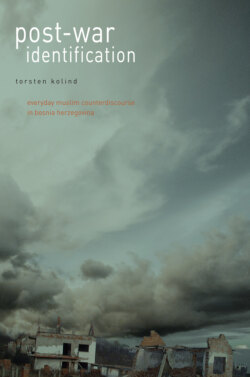Читать книгу Post-War Identification - Torsten Kolind - Страница 27
На сайте Литреса книга снята с продажи.
Hunger
ОглавлениеA third experiential theme relates to the hunger and thirst people felt, the diseases they contracted, and the lack of treatment available. In the prison camps the prisoners were given one loaf of bread every two weeks, as well as some soup, and almost nothing to drink. The camps were extremely hot, and the constant thirst was unbearable. Some people urinated in a tin can, filtered it through a sock, and drank it. Aziz told me:
I was thirsty and nobody would give us water. They brought one milk-can of water to 500 people so everybody pushed and fought for the water. You opened your mouth, but there was no water. It was worse not to have water than not to have food. After the Red Cross had been in the prison-camp (logor) the Croats began to give us a little more water. But it was not clean water, it was dirty. The water was reddish. But we drank it, because we were thirsty. When you had to pee or go to the toilet, you did it where we slept, and we did it in buckets and some days you did not know if you should use those buckets to pee in or drink water from.
The women and children also starved after being driven to the Muslim-controlled areas. At first some could live on the food they had brought with them, but it did not last long. Some food could be bought, but it was extremely expensive. So the money some people had managed to bring with them was soon spent. Here are the words of Nusreta:
It was a hard life, when we stayed there. So hard that we did not have anything to eat. Once we only had 350 grams of food for fifteen days. You were so hungry. And some of the old people, they starved to death. We ate grass. We soon learned to recognise every sort of grass, and that was one of the things that saved people, and then you ate fruit, grapes. Some got dysentery. A lot of people got that disease, because you drank too much water and hardly ate. The shells were falling all the time, and the shells killed people.
TK: Didn’t you receive humanitarian aid?
Nusreta: We didn’t receive much humanitarian aid, because the Croats would not permit it to pass through to us. They stopped the convoys […] and plundered them. It was very difficult […]. And the old people who could not search for food, they starved to death. There was this woman, one of the richest in Stolac, she lived alone in Stolac. When we were expelled she came to the same village as me and she also starved to death. Nobody could help her, or give her grass or grapes or other kind of fruit. It was terrible. I hope God will not give such a thing again (the saying spomenulo se ne ponovilo se: you can talk about it, but you do not hope it will happen again). Never again, it would be better to be dead than experience it again […]. I had a good friend, she took care of my daughter, she brought her some milk. Every night her son brought her some milk […]. One of her sons was at the front facing the Serbs, a Chetnik killed him. She and her family were very kind, and she saved my little daughter. We all had a hard time when her son was killed. It was like he was one of ours [one of the family]. I’ll never forget how well they treated us.
